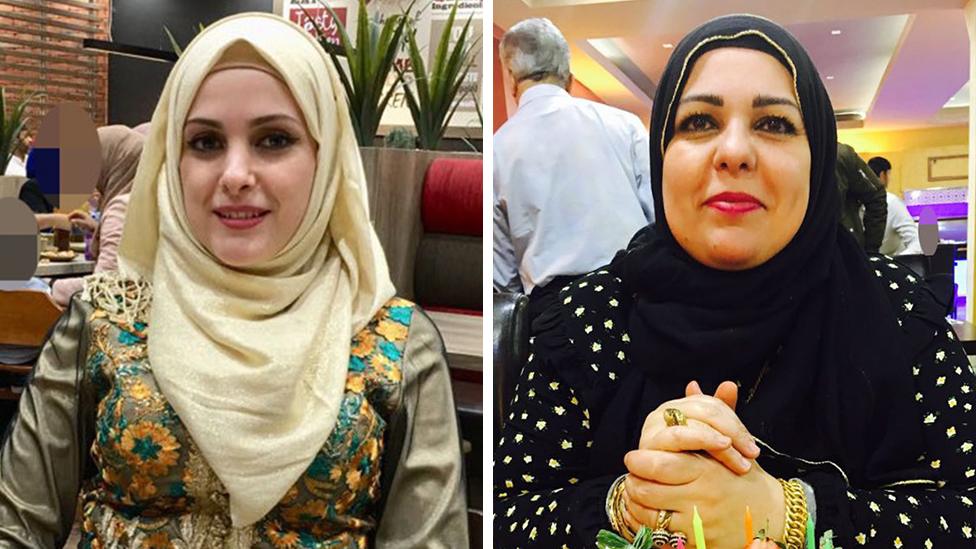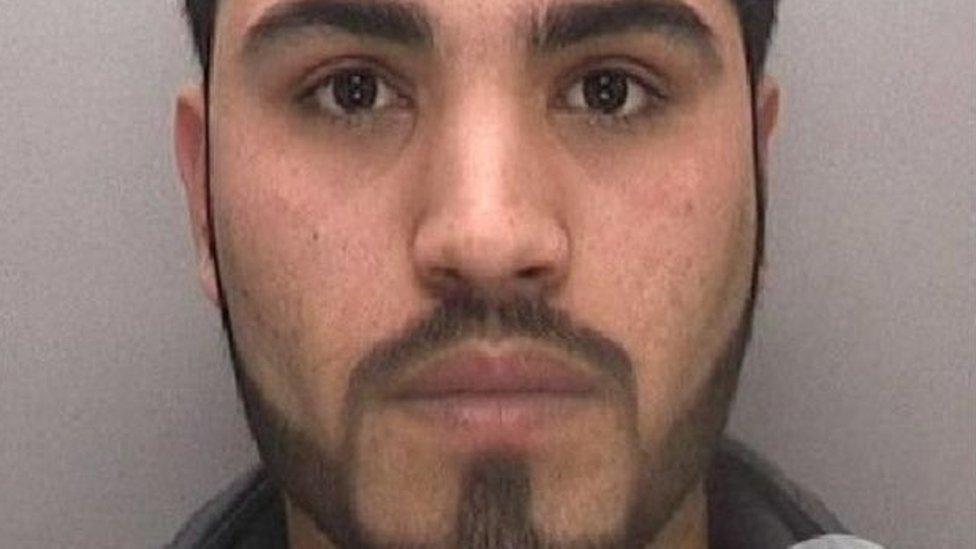Police errors contributed to Solihull deaths
- Published
Listen to 999 call Raneem Oudeh made before hours her death
Two women who were stabbed to death after repeated calls to police were murdered while on the phone to officers begging for help, their family says.
Raneem Oudeh and her mother Khaola Saleem were killed in Solihull in 2018 by Raneem's estranged husband Janbaz Tarin.
A jury at their inquests found police errors "materially contributed" to their deaths.
West Midlands Police has apologised to the family.
The inquest jury ruled the pair were unlawfully killed in the early hours of 27 August.
Tarin was jailed for a minimum of 32 years in December 2018, after admitting murdering them.
After the inquest, Mrs Saleem's sister, Naur Norris, said West Midlands Police "had so many opportunities to save their lives, right up until the end".
'Failed beyond imagination'
In their final hours, Ms Oudeh made six 999 calls after Tarin struck her at a restaurant and followed the pair home, but officers failed to reach them in time.
In the last call, played at the inquest, Ms Oudeh's screams could be heard as she was attacked by her estranged husband.
It was not the first time Tarin's actions had been reported to police, with the Independent Office for Police Conduct (IOPC) detailing 10 domestic abuse incidents reported to West Midlands Police between April and August.
Ms Norris said the force had "failed Khaola and Raneem beyond imagination".

Raneem Oudeh (left) and her mother Khaola Saleem died outside Mrs Saleem's home in Solihull in 2018
IOPC regional director Derrick Campbell said the circumstances of the murders were "shocking and profoundly disturbing".
He said the watchdog's investigation found police had failed to carry out satisfactory intelligence checks when responding to domestic incidents between Ms Oudeh and Tarin and "dealt with each incident in isolation".
Officers did not consider a potential increase in the level of violence, he added.
Speaking on behalf of the family, Ms Norris said her sister and niece's legacy should be a "cultural change" and "no more dismissal of the victims of domestic abuse".
Ms Norris said little had changed since 2018 and clearer records of incidents were needed, with officers requiring more training in how to deal with such crimes.
Naur Norris, aunt to Raneem Oudeh and sister to Khaola Saleem, criticises police
The inquest had previously heard Ms Oudeh joined her mother and family in the UK in 2014 after fleeing the war in Syria.
She first met Tarin after enrolling at Solihull College and they had an Islamic marriage in April 2017.
Ms Norris told the inquest that he had treated her as "his belonging".
The marriage started to break down after Tarin travelled to Afghanistan, where it emerged he had another wife and children.
The inquest heard he had stalked Ms Oudeh after their relationship broke down and even carved her name into his arm with a razor.
Ms Norris said several phone calls were made by her niece to police about her abusive relationship, but that they led to little action, with visits from social workers leaving her "scared" they would remove her child.

Ms Oudeh's ex-partner Janbaz Tarin was jailed for at least 32 years for murder in December 2018
Ms Oudeh had also applied for a non-molestation order, but on the night of 26 August, Tarin followed her and her mother to a restaurant where he struck Ms Oudeh and then followed them as they left.
The inquest jury was told police were called, but their response was delayed due to a firearms incident.
The women were stabbed to death outside Mrs Saleem's home just after midnight.
The family and supporters applauded jurors as they left court and Ms Norris thanking them for helping to "expose the truth of the failing".

IOPC key findings
The IOPC is clear that there were missed opportunities to reduce the risk Tarin posed to Ms Oudeh and police must learn lessons around domestic abuse
The watchdog served nine West Midlands Police officers with misconduct notices. Of those, five were found to have a case to answer and received management action
A complaint from the family that police had failed to exercise powers available to them to protect Ms Oudeh was upheld
The watchdog found that although Tarin was suspected of assaulting Ms Oudeh, he was not arrested or requested to attend voluntary interview
Police resourcing issues and a lack of clear communication also played a role the night Ms Oudeh and Mrs Saleem were murdered

Analysis by Phil Mackie, BBC Midlands Correspondent
We know from the rest of the inquest that on the night the killings took place that there was a firearms incident going on in the same area and all of the resources that police had available were concentrating on that, so although Raneem made a number of 999 calls on that night, nobody really came to see her.
The force didn't get anyone to her until after the final call, during which you can hear her screaming as Tarin attacked her.
It was a particularly awful call and difficult for her family, who were in the inquest to listen to that.

West Midlands Assistant Chief Constable Andy Hill said the murders were "among the most shocking and appalling crimes in our region in recent years".
"More could have been done to protect Raneem from the campaign of domestic abuse that she suffered in the months leading up to her death at the hands of the man who would go on to kill her and her mother," he said.
He added changes had been made since the murders, including increasing the number of officers investigating domestic abuse offences, and promised more would be done.
But he accepted "none of this will undo the devastation that the murders of Raneem and Khaola caused to their family".

Follow BBC West Midlands on Facebook, external, Twitter, external and Instagram, external. Send your story ideas to: newsonline.westmidlands@bbc.co.uk, external